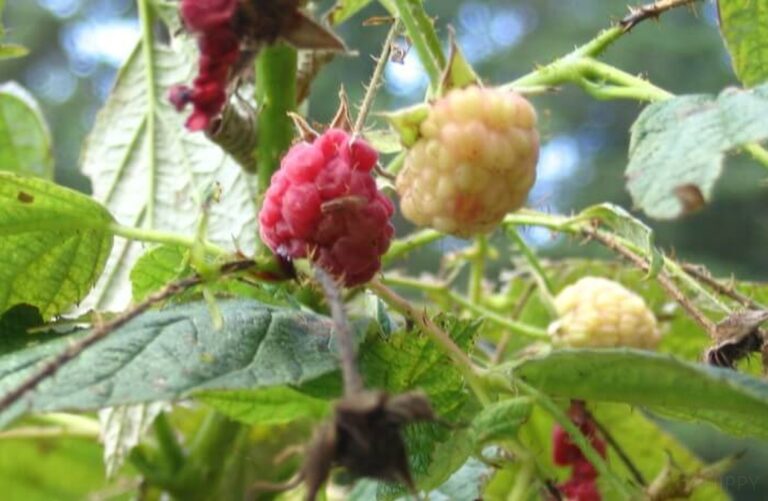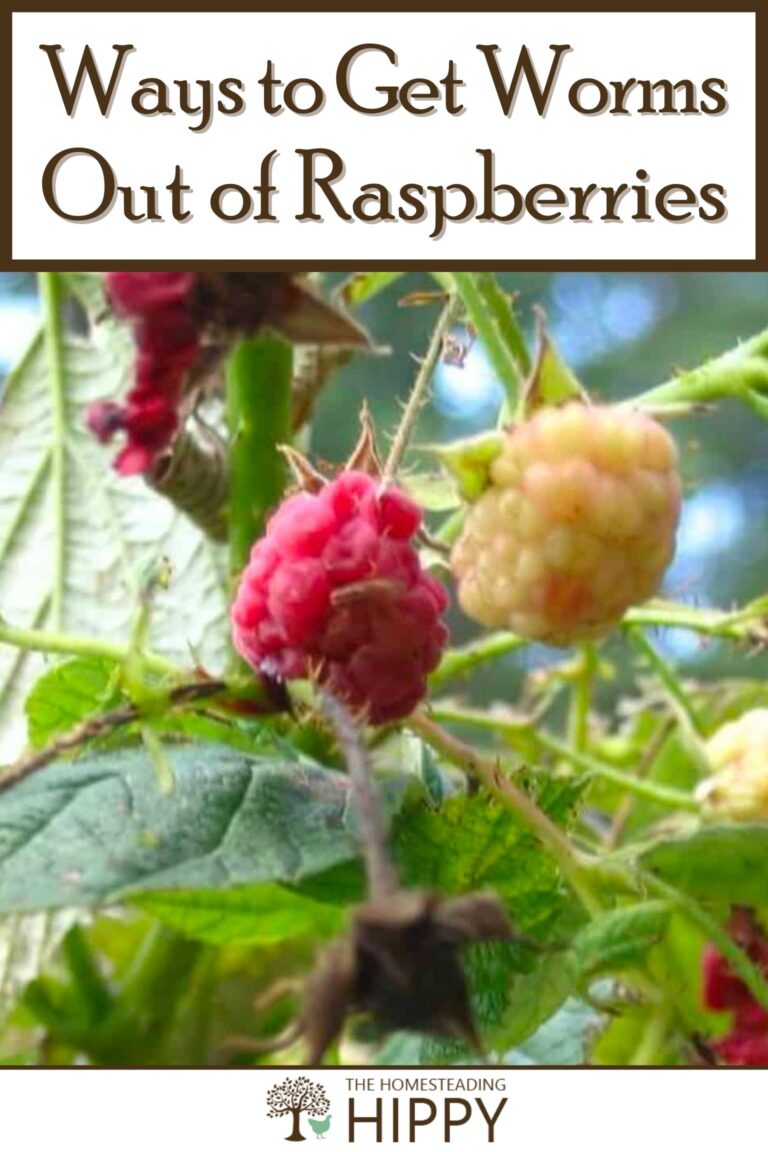If you have a raspberry plant, chances are you’ve come across raspberry worms. These tiny pests can cause serious damage to your crops, so it’s important to get rid of them as soon as possible.

Fortunately, there are several ways to effectively get rid of these worms from your garden. In this blog post, we’ll take a look at the different methods for getting rid of these pesky critters.
Table of Contents
What Are the Worms in My Raspberries?
Have you recently noticed small white worms wriggling in your raspberries? Don’t panic. They’re likely spotted wing drosophila larvae, a common fruit pest.
These tiny yellow-brown flies lay their eggs in soft fruit, like raspberries and strawberries, when the fruit is still on the vines. Any harvested fruits may contain the larvae.
Remember to check for signs of insect damage before you enjoy your raspberries – your hard-earned effort deserves a quality reward!
Do I Really Need to Get Rid of These Worms?
When it comes to raspberry worms, deciding whether or not they need to be eradicated is largely a matter of personal preference.
While these pests are unsightly, the damage they cause to the fruit is minimal.
Tiny infestations typically don’t do considerable harm — in most cases, the amount of damage caused by the larvae will be greatly outweighed by proper prevention and pruning practices.
If you decide that these worms need to go, then there are some safe and effective treatments available – such as natural predators like lacewings and parasitic nematodes – that can help keep them away from your plants. More on this below!
Signs of Raspberry Worms on Plants
Let’s take a look at a few signs of raspberry worms and how to handle them.
1. Leaf Damage
One common sign of raspberry worms is leaf damage. You may notice that some leaves on the plant appear chewed when compared to other healthy leaves nearby.
This is commonly caused by the larvae stage of the raspberry beetle or by another type of caterpillar.
The larvae feed on the leaves and will leave behind small holes or jagged edges where they have eaten away at the leaf.
2. Bud Holes
Another sign that you might have a raspberry worm problem is bud holes in your plants’ blossoms or buds.
As they feed, these caterpillars will chew away at any new buds that are forming, making it difficult for your plants to produce fruit or blossom correctly.
3. Worms in Harvested Fruits
Once your raspberries are ready for harvest, keep an eye out for tiny worms inside the fruits themselves.
This can be hard to spot at first since the worms are often very small, but once you start noticing them it becomes easier to detect their presence in future harvests.
How to Get Rid of Raspberry Worms on Harvested Fruits
Fortunately, there are some steps you can take to keep your harvest safe from these pesky critters.
1. Harvest ASAP
The first step in keeping your raspberry crop safe from raspberry worms is to harvest as soon as possible after the fruit has ripened.
This will help ensure that the worms don’t have time to lay eggs on the fruit. If you wait too long, the eggs will hatch and the worms will begin feeding on the raspberries.
2. Refrigerate or Freeze the Harvest
Once you’ve harvested your raspberries, it’s important to store them in an environment that is too cold for raspberry worm eggs to survive.
The ideal temperature range is between 32°F – 45°F (0°C – 7°C) (at least – freezing works just as well, too).
You can achieve this by either refrigerating or freezing your harvest immediately after picking it up. This will help prevent any existing eggs from hatching into larvae and infesting your crop.
3. Soak in Saltwater
Another method of preventing raspberry worm infestation is to soak your fruits in salted water before consuming them.
This will help kill any existing larvae or eggs that may be present on the surface of the raspberries, making them safe for eating.
To do this, simply mix 1 tablespoon of salt with 1 cup of water and submerge your raspberries for at least 15 minutes before draining them off and eating them.
4. Do the “Float Method” to Determine if Fruits Are Infested
If you’re not sure if your fruits are infested with raspberry worms, you can use a simple method called “the float test” to check if they’re affected by these pests.
Simply fill a bowl with water and drop a few berries into it—if they float, then there’s a good chance that they are infected with raspberry worms as these insects tend to make their homes inside ripe fruits which become buoyant in water due to air trapped inside their shells!
Getting Rid of Raspberry Worms on Plants
Here are a few tips to help you get rid of the raspberry worms on your plants before you bring a single piece of fruit inside.
1. Remove By Hand
The simplest way to get rid of raspberry worms is by removing them by hand. Use gloves and carefully inspect each berry for evidence of worms.
If you find any, discard them immediately, and don’t add them to your compost pile or use them in any other way that may spread the infestation further.
This method isn’t foolproof—it requires time and patience—but it is an effective way to reduce their numbers quickly.
2. Try Beneficial Insects
Another option is to introduce beneficial insects into your garden such as ladybugs, lacewings, and praying mantises which will eat the raspberry worms and help keep their population under control.
You can purchase these beneficial insects online or at your local garden center and release them into your garden regularly throughout the season.
3. Till Each Year
Tilling is another effective way to reduce the number of raspberry worms in your garden each year.
By tilling the soil each year before planting your raspberries, you can disrupt their life cycle and prevent them from laying eggs in the soil.
This will help keep their numbers under control so they don’t become a major problem throughout the season.
4. Use Odor Traps
A third method for eliminating raspberry worms is using odor traps. These traps emit odors that attract the insects which then become stuck on sticky globs inside the trap where they eventually die off.
This can be an effective way to reduce their numbers without having to use harsh chemicals or pesticides in your garden.
5. Try Spinosad
Spinosad is an organic insecticide derived from naturally-occurring bacteria that has been shown to be effective against many types of insects including raspberry worms.
It’s important to follow all directions when using this product because it can be toxic if used incorrectly or in large amounts so make sure you read all instructions before applying it to your plants or soil around them.
6. Use Neem Oil
Neem oil has also been shown to be effective against many types of insects including raspberry worms but it should only be used sparingly due its toxicity when ingested by humans or pets if not applied correctly so always make sure you read all instructions prior to using any type of chemical on your plants or in your soil around them.
7. Get Rid of Infested Fruit
If you notice signs of infestation on any fruit growing on your raspberries remove it immediately and don’t add it onto any compost piles or use it in any other way that may spread the infestation further as this could potentially lead more damage done by these pests over time if left unchecked even with other methods used above mentioned here today!
8. Choose an Early-Ripening Variety
One way to avoid raspberry worms is to choose an early-ripening variety of raspberries.
These varieties will usually ripen before the worms have a chance to do too much damage. Some popular early-ripening varieties include Tara, Heritage, and Polana.
9. Monitor Plants Carefully
It’s important to monitor your raspberry plants carefully for signs of infestation. Look for telltale signs such as notched or chewed leaves and frass (insect droppings). If you spot any of these signs, it’s time to take action!
10. Prune Appropriately
Pruning is an important part of keeping your raspberry patch healthy and free from pests like raspberry worms.
Regularly pruning dead or diseased branches helps keep your plants healthy and makes them less attractive to pests.
Additionally, pruning off any damaged or discolored leaves can help reduce the risk of infestation as well.
11. Keep Your Garden Clean
Keeping your garden clean is another key part of keeping pests away from your raspberries. Make sure to remove any fallen fruit or leaves that could attract pests like the raspberry worm.
Also be sure to clear away weeds, which can provide cover for pests and give them access to food sources in your garden.
12. Cover Your Plants with Row Covers
One way to protect your plants from raspberry worms is by covering them with row covers during their growing season.
Row covers are fabric covers that can provide protection from both heat and cold as well as insects like the raspberry worm.
They also provide extra insulation for tender new growth and help retain moisture in the soil around your plants.
13. Use Chickens
Using chickens in your garden can also be an effective way to control pests like the raspberry worm.
Chickens will happily eat any insects they find in the garden including pesky parasites like the raspberry worm!
Just make sure that you keep an eye on them so they don’t damage any other parts of your garden while they’re busy snacking on bugs!
Don’t Panic if You Eat a Few
If you’re a fan of fresh, homegrown fruit, chances are that at some point you’ve stumbled upon a worm or larvae in your precious raspberries.
Although it’s easy to panic when this happens, rest assured that if you accidentally ingest one of these critters, there is no need for alarm – although it might box-you-off a bit!
In actuality, these harmless creatures won’t hurt you – though it’s better to remove them before eating. You should also remove worms in blackberries, strawberries, and other berries.
So the next time you come across a worm among your raspberries, no need to hit the panic button…just pick it out and enjoy the rest!
And if it seems like you’re finding more worms than you used to, take the time to follow the steps above to eradicate these pests.


Rebekah is a full-time homesteader. On her 22 acres, she raises chickens, sheep, and bees, not to mention she grows a wide variety of veggies. She has a huge greenhouse and does lots of DIY projects with her husband in her ever-growing homesteading endeavor. Learn more about Rebekah here.

Can these worms hurt you? I found a teeny worm on raspberry from my garden that got on my hand and attached to my skin. It hurt. I squashed it but I had a bump there for a week.